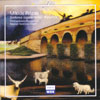Rózsa Sinfonia concertante; Tripartita
Out of Hollywood, there needs to be no apology for Rozsá’s music
View record and artist detailsRecord and Artist Details
Composer or Director: Miklós Rózsa
Genre:
Orchestral
Label: CPO
Magazine Review Date: 13/2005
Media Format: CD or Download
Media Runtime: 64
Mastering:
Stereo
DDD
Catalogue Number: CPO999 839-2

Tracks:
| Composition | Artist Credit |
|---|---|
| Sinfonia Concertante |
Miklós Rózsa, Composer
András Agoston, Violin László Fenjó, Cello Miklós Rózsa, Composer Philharmonia Hungarica Werner Andreas Albert, Conductor |
| Hungarian Nocturne |
Miklós Rózsa, Composer
Miklós Rózsa, Composer Philharmonia Hungarica Werner Andreas Albert, Conductor |
| Tripartita |
Miklós Rózsa, Composer
Miklós Rózsa, Composer Philharmonia Hungarica Werner Andreas Albert, Conductor |
Author: K Smith
One would think one could listen to Miklós Rózsa’s concert music without dragging Hollywood into it, but not until three-quarters of the way through the booklet-note is there mention of the pieces recorded here. Optimistically, I infer two things: first, that the stigma of commercial work is finally waning, and second, that perhaps Rózsa’s work in entertainment really has a serious bearing on his art.
Those who’ve always taken the title of the his autobiography, Double Life, at face value should think about how interrelated those lives really were. Rózsa’s classic film scores remain striking in their graceful sophistication. Likewise, these orchestral works masterfully tweak the modernist language of Stravinsky and Bartók in playing to the audience.
Safe to say, these performances benefit heavily from having Rózsa’s fellow countrymen at the helm. The Philharmonia Hungarica (a German-based group of musicians who fled Hungary during the 1956 uprising) bring out precisely the national elements that many orchestras lack, making the Hungarian Nocturne seem like a linear descendant of Bartók and Kodály.
In the Sinfonia concertante, violinist András Agoston and cellist László Fenjó move their virtuosity from centre-stage back into the fuller orchestral backdrop, as if trying to avoid any comparison with the original soloists, Heifetz and Piatigorsky. Tripartita, as brilliantly rendered here, shares a similar vocabulary with many composers who might seem at first to be speaking a different language (Delius comes to mind). In any case, this collection remains delightful, with the music given illuminating performances.
Those who’ve always taken the title of the his autobiography, Double Life, at face value should think about how interrelated those lives really were. Rózsa’s classic film scores remain striking in their graceful sophistication. Likewise, these orchestral works masterfully tweak the modernist language of Stravinsky and Bartók in playing to the audience.
Safe to say, these performances benefit heavily from having Rózsa’s fellow countrymen at the helm. The Philharmonia Hungarica (a German-based group of musicians who fled Hungary during the 1956 uprising) bring out precisely the national elements that many orchestras lack, making the Hungarian Nocturne seem like a linear descendant of Bartók and Kodály.
In the Sinfonia concertante, violinist András Agoston and cellist László Fenjó move their virtuosity from centre-stage back into the fuller orchestral backdrop, as if trying to avoid any comparison with the original soloists, Heifetz and Piatigorsky. Tripartita, as brilliantly rendered here, shares a similar vocabulary with many composers who might seem at first to be speaking a different language (Delius comes to mind). In any case, this collection remains delightful, with the music given illuminating performances.
Discover the world's largest classical music catalogue with Presto Music.

Gramophone Digital Club
- Digital Edition
- Digital Archive
- Reviews Database
- Full website access
From £8.75 / month
Subscribe
Gramophone Full Club
- Print Edition
- Digital Edition
- Digital Archive
- Reviews Database
- Full website access
From £11.00 / month
Subscribe
If you are a library, university or other organisation that would be interested in an institutional subscription to Gramophone please click here for further information.




